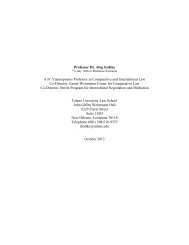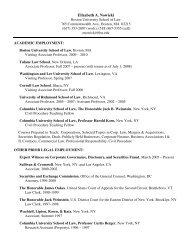Civil Codes of Louisiana - Tulane Law School - Tulane University
Civil Codes of Louisiana - Tulane Law School - Tulane University
Civil Codes of Louisiana - Tulane Law School - Tulane University
Create successful ePaper yourself
Turn your PDF publications into a flip-book with our unique Google optimized e-Paper software.
Winter 2008 The <strong>Civil</strong> <strong>Codes</strong> <strong>of</strong> <strong>Louisiana</strong> 10<br />
based on <strong>Louisiana</strong>-grounded equities and usages rather than upon the prior<br />
Spanish or French law or doctrinal writing. “By cloaking the origins <strong>of</strong> the<br />
<strong>Louisiana</strong> Code provisions in mystery, the jurisconsults tended to free them from<br />
meanings or applications restricted to those inherited from their known ancestors.<br />
Having no meaning fixed by an ancient day, the general principles <strong>of</strong> the<br />
<strong>Louisiana</strong> Code could be applied to the new conditions arising decade after<br />
decade.” 18<br />
C. Repeal <strong>of</strong> Prior <strong>Law</strong>s<br />
27 The <strong>Civil</strong> Code <strong>of</strong> 1808 did not repeal all prior laws. The enabling statute<br />
provided that “whatever in the ancient laws <strong>of</strong> this territory, or in the territorial<br />
statute, is contrary to the dispositions contained in said digest, or irreconcilable<br />
with them, is hereby abrogated.” This provision was compatible with the notion <strong>of</strong><br />
a digest or compilation rather than a true civil code. <strong>Civil</strong> codes are conceived as<br />
comprehensive enactments, designed to be complete within their area <strong>of</strong><br />
application, and intended to break with the past.<br />
28 It is neither proper nor necessary to go outside a civil code and look at<br />
previous legislation for the purpose <strong>of</strong> ascertaining the law. The provision in the<br />
enabling statute has been criticized, therefore, as an inadvertence in draftsmanship<br />
and as an entirely useless precaution. Indeed, if the 1808 Code was actually<br />
conceived as a digest <strong>of</strong> existing laws, the provision accomplished nothing that<br />
would not have been equally well accomplished by its omission, because,<br />
according to the principle <strong>of</strong> tacit abrogation, the latest expression <strong>of</strong> legislative<br />
will would have been given precedence over ancient laws.<br />
29 Moreover, if the intention <strong>of</strong> the legislature was to retain some <strong>of</strong> the ancient<br />
laws in force, it would have been a preferable legislative technique to reaffirm the<br />
application <strong>of</strong> these laws by specific declaration in the enabling statute. In the<br />
absence <strong>of</strong> such a declaration, the <strong>Louisiana</strong> Supreme Court rightly held in 1812<br />
that the Code was “but a digest <strong>of</strong> the civil law, which regulated the country under<br />
the French and Spanish monarchs.” 19 And, in 1817, the same court declared<br />
further that the ancient laws “must be considered as untouched, wherever the<br />
alterations and amendments, introduced in the digest, do not reach them.” 20<br />
18 Tate, The Splendid Mystery <strong>of</strong> the <strong>Civil</strong> Code <strong>of</strong> <strong>Louisiana</strong>, 3 <strong>Louisiana</strong> Review 1, 11 (1974).<br />
19 Hayes v. Berwick; 2 Mart. (O.S.) 138, 140 (La. 1812)<br />
20 Cottin v. Cottin, 5 Mart. (O.S.) 93, 94 (La. 1817).<br />
Vol. 1 CIVIL LAW COMMENTARIES Issue 1





